How to Optimize Your Computer for Gaming Performance
If you’re a gamer, you know that having a computer that can handle the latest games is crucial. However, sometimes even the most powerful computers can struggle with gaming performance. In this article, we’ll go over some tips and tricks on how to optimize your computer for gaming performance, so you can get the most out of your gaming experience.

1. Upgrade Your Hardware
One of the first things you should consider when trying to optimize your computer for gaming performance is upgrading your hardware. This can include upgrading your graphics card, adding more RAM, and getting a faster processor.
When it comes to graphics cards, you want to make sure you have one that is capable of handling the latest games. Look for a card with at least 4GB of VRAM and a clock speed of at least 1.5GHz.
Adding more RAM can also help improve gaming performance. Aim for at least 8GB of RAM, but if you can afford it, 16GB is even better.
Finally, getting a faster processor can help improve overall system performance, which will translate to better gaming performance. Look for a processor with at least 4 cores and a clock speed of at least 3GHz.
2. Optimize Your Graphics Settings
Once you’ve upgraded your hardware, the next step is to optimize your graphics settings. This can be done by adjusting the settings in the game itself, as well as in your graphics card’s control panel.
In the game, start by lowering the graphics settings to the lowest possible, and then gradually increase them until you find a balance between performance and visual quality. You can also adjust settings such as anti-aliasing, texture quality, and shadows to further optimize performance.
In your graphics card’s control panel, you can also adjust settings such as the power management mode, texture filtering, and vertical sync to further improve performance.
3. Close Unnecessary Programs
Another thing that can affect gaming performance is having too many programs open at once. Make sure to close any programs that you aren’t using while gaming, such as web browsers, music players, and other applications.
You can also use the task manager to see which programs are using the most resources and close them if necessary.
4. Keep Your Drivers Up to Date
Keeping your drivers up to date is crucial for optimal gaming performance. This includes your graphics card drivers, as well as your motherboard, sound card, and other drivers.
You can usually find the latest drivers on the manufacturer’s website. Make sure to download and install them regularly to ensure your computer is running at its best.
5. Defragment Your Hard Drive
Over time, your hard drive can become fragmented, which can slow down your computer’s performance. To fix this, you can use the built-in Windows defragmentation tool.
To access this tool, go to the start menu and search for “defragment and optimize drives”. From here, you can analyze your drives and defragment them if necessary.
6. Use a Game Booster
Finally, you can also use a game booster to optimize your computer for gaming performance. Game boosters work by temporarily disabling unnecessary processes and services while you’re gaming, which can improve performance.
Some popular game boosters include Razer Cortex and Game Fire.
Conclusion
In conclusion, optimizing your computer for gaming performance can be a time-consuming process, but it’s worth it to get the best possible gaming experience. By upgrading your hardware, optimizing your graphics settings, closing unnecessary programs, keeping your drivers up to date, defragmenting your hard drive, and using a game booster, you can ensure that your computer is running at its best for gaming.












